
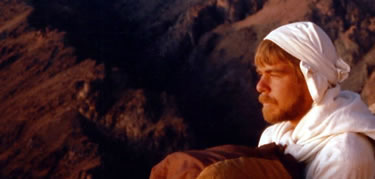
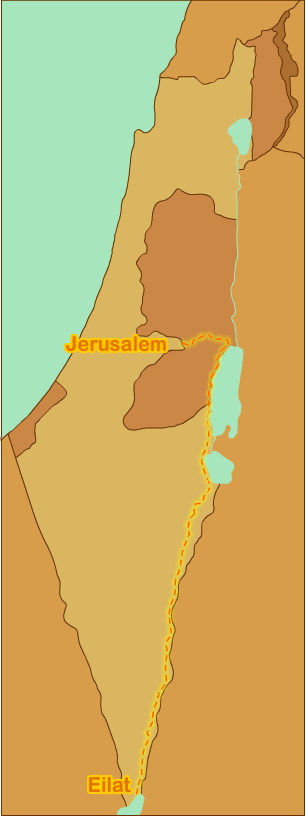

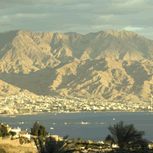
 Reuben and I set out from Jerusalem and took the bus through the West Bank and the Arabah to Eilat.
We found a good camping spot on the beach and then wandered into town at night. We stopped at a local bar and talked until late.
I don’t recall exactly what we talked about, but I remember Reuben as a very kind, sensitive person.
He played guitar, and I remember the time he welled up with tears after playing the song “The Great Mandela” by Peter, Paul and Mary.
So maybe we talked about politics and war and peace. Or maybe he told me about his volunteer position observing cows at a kibbutz,
an experience he hoped would get him into vet school at UC Davis.
After a lot of talk, and a few Goldstars, we wandered back to the beach to sleep.
Reuben and I set out from Jerusalem and took the bus through the West Bank and the Arabah to Eilat.
We found a good camping spot on the beach and then wandered into town at night. We stopped at a local bar and talked until late.
I don’t recall exactly what we talked about, but I remember Reuben as a very kind, sensitive person.
He played guitar, and I remember the time he welled up with tears after playing the song “The Great Mandela” by Peter, Paul and Mary.
So maybe we talked about politics and war and peace. Or maybe he told me about his volunteer position observing cows at a kibbutz,
an experience he hoped would get him into vet school at UC Davis.
After a lot of talk, and a few Goldstars, we wandered back to the beach to sleep.


In the morning we tried snorkeling in Eilat at Coral World and realized that our swimming goggles were not going to work.
They gave us double and quadruple vision of the fish around us. So we had to go to a store in town to buy snorkeling gear.
The splurge was well worth it. Snorkeling in the Red Sea turned out to be some of the best in the world.
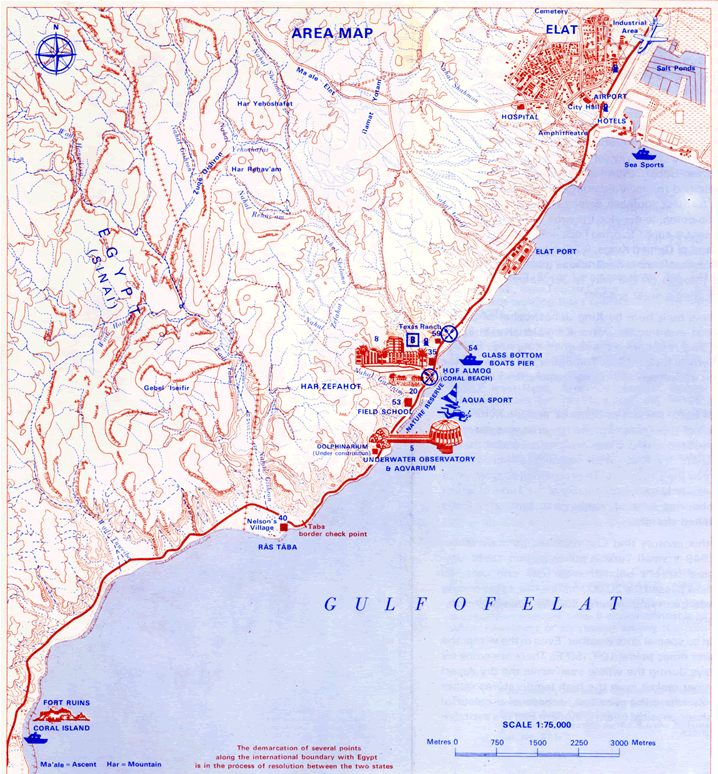
We walked to the border and crossed at Taba. We were hassled a bit, but we made it through.
As we waited in the Egyptian border station, we made friends with one of the Egyptian border guards, Abdal.
He gave us directions to his house in Nuweiba and asked us to come for a visit. We walked to the beach across from Coral Island and slept there.
Pharaoh's Island, also called Coral Island or Geziret Faroun, lies eight kilometers south of Taba and 250 meters off the coast. The Phoenicians were the first to make use of this island's fine natural harbor during the 10th century BC to foster trade with Egypt. Much later the small rocky island came under Byzantine control. Early in the 12th century the Crusaders built a fortress there to protect pilgrims traveling between Jerusalem and the Monastery of St Katherine and to harass Arab trade. Sultan Salah El Din (Saladin) evicted the Crusaders from the island and significantly strengthened the fortress later in the 12th century. The Mamelukes and Ottomans probably further fortified it when they became the dominant force of the region. Today you can follow in the footsteps of the legendary Lawrence of Arabia and explore the fully renovated fortress of medieval character with its towers, arched doorways, sleeping quarters, baths and kitchens. From www.goredsea.com/en_quseir.aspx, April 6, 2008

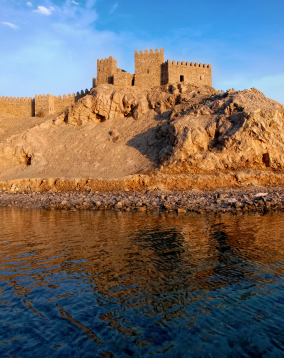
Reuben and I snorkeled out to Coral Island and saw the fortress.
We needed water, and so we hiked out to a lonely American outpost in the middle of the desert.
American soldiers had been stationed here as part of the peace treaty between Israel and Egypt,
and the soldiers were happy to see some other Americans. We passed them our green plastic water bottles and they filled them for us. Then we returned to our camp.
We walked to the fjord, but we couldn’t tramp on the Israeli boats there.
So finally, in the afternoon, we caught the bus to Nuweiba, Abdal’s home town.
We snorkeled a bit, and as evening came on we followed Abdal’s directions to his house. We hoped he would invite us to spend the night.
Abdal gave us a wonderful Egyptian meal, and we talked and sang late into the night. The entertainment was wonderful, as everyone joined in the singing.
Finally, past ten, we noticed our host excused himself for a long time.
No invitation to spend the night so far. We waited and worried.
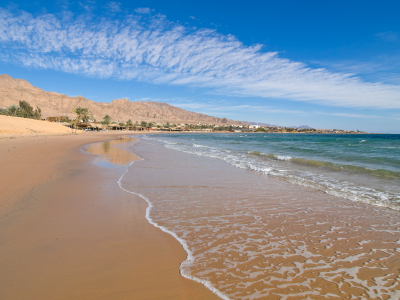 As the minutes and hours passed we realized there would be no invite and we would need to leave. Where would we spend the night?
We left Abdal’s house about midnight and began walking the deserted streets of Nuweiba.
As the minutes and hours passed we realized there would be no invite and we would need to leave. Where would we spend the night?
We left Abdal’s house about midnight and began walking the deserted streets of Nuweiba.
We made our way toward the beach, and by about 1 a.m., quite exhausted, we found a likely spot to crash.
We were a little nervous, and wanted to find a place somewhat hidden, less exposed, so when we came across a small stand of bushes
and palm trees it seemed like a good spot. It was pitch dark, we were exhausted and disappointed, but we were grateful
for a place to throw our sleeping bags. There were two small indentations chopped out of the palm bushes,
which seemed like the perfect place to squeeze out of sight, so we stuck our bags into these chopped-out spots and immediately fell asleep.
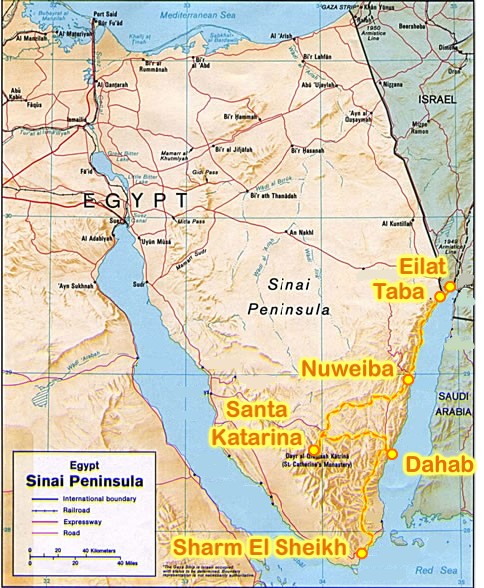 Our journey from Eilat to the tip of the Sinai peninsula
Our journey from Eilat to the tip of the Sinai peninsula

In the morning we were unhappy to discover the purpose of these chopped out spots in the bushes—a sort of desert rest stop. In the darkness and our exhaustion we hadn’t noticed.
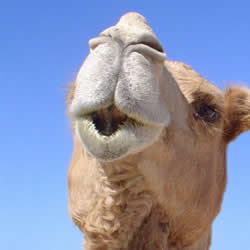
I was delighted to find a camel wandering around our camp, my first close-up encounter with one.
I didn’t know much about camels, but I did know something about horses. I had visited my Uncle Jean’s farm in Nebraska many times as a boy,
and I knew how to feed a horse: he had taught me to place a sugar cube on my open palm so that the horse
would be able to pick up the food without hurting my hand. I took a piece of bread and carefully placed it on my open palm.
The camel sniffed the bread and opened its lips. Then it took a bite, chomping the bread together with my hand. I howled and jerked my hand away.
The camel blinked and chewed.
We walked back into town and bargained with a local Bedouin boy to drive us in his jeep to Mt. Sinai. He spoke Hebrew, because of the until-recent Israeli occupation,
so we bargained back and forth in Hebrew, unable to agree on a price. I was proud of myself for driving a hard bargain.
I always felt an underlying fear that I would get ripped off by these expert Middle Eastern negotiators. (This fear was usually well-founded.)
I think he wanted to charge 45 pounds each way, and we were holding out for 40 pounds each way.
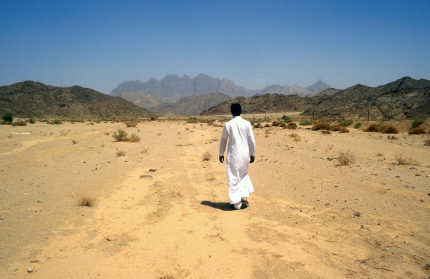 We finally came to some compromise—I think we decided to pay
45 pounds one way and 40 the other—but I told Reuben to pay him the higher portion on the first leg, to show our good faith.
We finally came to some compromise—I think we decided to pay
45 pounds one way and 40 the other—but I told Reuben to pay him the higher portion on the first leg, to show our good faith.
The ride through the heart of the Sinai to Santa Katarina was grueling and stunning. We bounced hard in the back of an open Bedouin jeep.
Our driver, his brother, and our hitchhiker—another Bedouin on his way to visit family, I think—wore the long Bedouin robes.
Reuben and I wore our California Bedouin hats, made from tying the sleeves of a white t-shirt around your head so that the shirt
covers your head and drapes down over the back of your neck. We were jammed in with the equipment in back.
The dust was blowing, the sun was blazing, and there was nothing around but rocks, mountains and scraggly bushes.
We wore our swimming goggles to keep the sand out of our eyes, and I felt like Lawrence of Arabia, but then I noticed Reuben.
“You look like someone dumped a bag of flour over your head!” I laughed.
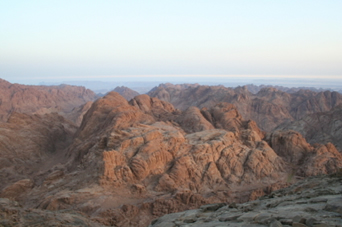
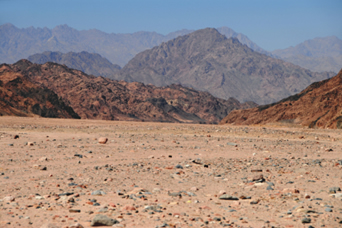 The mountains had been etched by the wind into intricate patterns. Many of them looked like ancient temples with rows of columns, or lines of carved, human-like figures.
The colors were startling: red, green, brown, purple, black. I was especially struck by the black-red mountains.
The mountains had been etched by the wind into intricate patterns. Many of them looked like ancient temples with rows of columns, or lines of carved, human-like figures.
The colors were startling: red, green, brown, purple, black. I was especially struck by the black-red mountains.
When we arrived at the monastery, we took a whirlwind tour, quickly rushing through and viewing some of the sites.
Piles of skulls. A sanctuary. But since it was getting dark, we wanted to get on with our objective: hiking up Mt. Sinai.
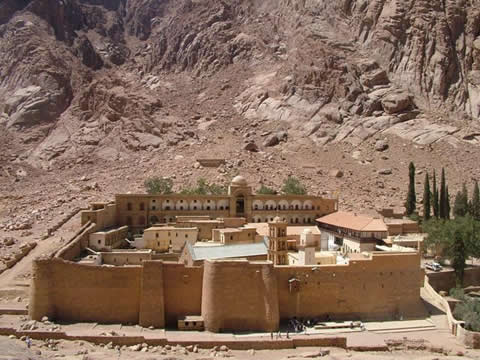 We began walking up the stone steps, called the “steps of repentance,” toward the summit of Sinai. The sun was setting and dusk gradually covered us.
The monastery below was wedged into the crack of this deep valley of black stone. At the far end of the valley was a slit of horizon with the last of the sun’s redness.
I thought I was looking down over Shangri La. We hiked higher and higher through the dark until after what seemed like hours a stone gateway suddenly appeared.
It felt like a door at the edge of the world. Step through this gate into—what? We passed through the gate,
rounded a corner and encountered a tall monolith, straight and black, bursting out at the top in scraggles and flames.
This was Moses’ mountain, Moses of the burning bush, Moses from another world so long ago.
We began walking up the stone steps, called the “steps of repentance,” toward the summit of Sinai. The sun was setting and dusk gradually covered us.
The monastery below was wedged into the crack of this deep valley of black stone. At the far end of the valley was a slit of horizon with the last of the sun’s redness.
I thought I was looking down over Shangri La. We hiked higher and higher through the dark until after what seemed like hours a stone gateway suddenly appeared.
It felt like a door at the edge of the world. Step through this gate into—what? We passed through the gate,
rounded a corner and encountered a tall monolith, straight and black, bursting out at the top in scraggles and flames.
This was Moses’ mountain, Moses of the burning bush, Moses from another world so long ago.
All the way up the mountain, Reuben and I had been gathering sticks. We hoped to make a fire to warm our campsite.
So when we reached the top I set to work. I was cold and tired, and tried and tried to light my pile of sticks.
Finally, in frustration, I scattered the sticks, throwing them down the side of Mount Sinai. Reuben was upset with me, but gentle in his reproach.
“Daveed?” he asked in a soft reprimand. I imagine Reuben, the experienced camper, could have made those sticks catch.
Like so often in these wanderings, what I discovered at the end was not at all what I had expected. No fire for us on Mount Sinai.
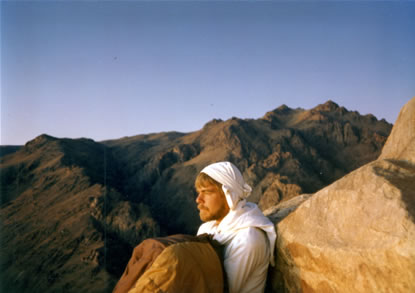

Watched the sunrise from Mt. Sinai. Met some Egyptian friends. Hiked down the other side and found the road south.
As we hiked between the mountains in this empty land, we came upon a large black Bedouin tent.
The people welcomed us in, although I hoped they did not have a feeling of obligation. The elder wrote down the family name in my notebook: Al Gebelia,
which refers to the mountian where they live, Gebel Musa.
"Ahalan w’sahalan," they said.
There was a large family in the tent, and they served us some food. There was a little bit of a miscommunication, because Reuben gave our can of corn—the gift
recommended by our guide books—to the mother of the family. I thought this might be culturally inappropriate, and took it back and gave it to the family head man.
Probably another cross-cultural blunder, but who could tell?
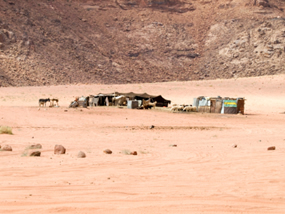
We turned west and climbed Mt. Asmar and arrived at Mt. Katarina at dusk.
On the trail back from Mt. Katarina to Dir Rabah Reuben and I could only travel by compass and map.
About ten o’clock at night we were feeling the pressure to get to our meeting spot in order to catch our ride the next morning.
We were pushing ourselves really hard. Then we came to a fork that wasn’t marked on the map. Which way should we go?
If we chose the wrong way, we could be in big trouble. It was so late already and we had to catch our ride early the next day.
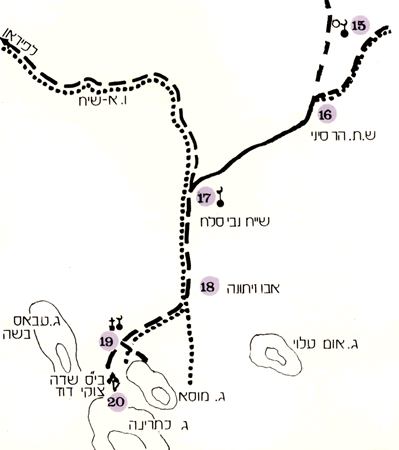
Reuben thought we should take the left fork. But I thought the right fork was the correct way. We both felt certain about our choice.
We sat at the fork, arguing back and forth for 20 minutes. I prayed and had no idea what to do. The situation was pretty serious.
I began to fear we really could miss our ride out of the desert.
Finally I said, “Reuben, I think you’re dead wrong, but we have to do something.”
Then we went down the left fork. It turned out to be the right way, thank God!
We ended back at Dir Rabah about eleven pm and collapsed into our sleeping bags.

Our jeep met up with us in the morning. We returned from the Sinai area to the main road and then on to Dahab.
We drove through mile after mile of barren desert, without a stick of vegetation anywhere.
Suddenly, a small, lonely tree appeared, offering a tiny patch of shade. Our Bedouin drivers seemed to know this spot and pulled over to the tree.
They gathered some twigs and wood and burned it down to coals.
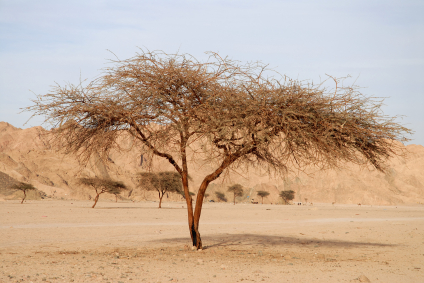 Then they got some flour, salt and water from the back of the jeep
and kneaded it into a dough, shaping it into a broad disk the size of a stuffed pizza. They scraped the coals aside, put this dough into the sand on top of the coals,
and then piled more sand and coals on top. After fifteen or twenty minutes they tapped the bread. It sounded hollow, so they turned it over.
After awhile longer, they dug it out and scraped off the burned top layer.
The Bedouin taught me how to cook in the desert: not with fire, but with coals. We had a cup of tea.
Then they got some flour, salt and water from the back of the jeep
and kneaded it into a dough, shaping it into a broad disk the size of a stuffed pizza. They scraped the coals aside, put this dough into the sand on top of the coals,
and then piled more sand and coals on top. After fifteen or twenty minutes they tapped the bread. It sounded hollow, so they turned it over.
After awhile longer, they dug it out and scraped off the burned top layer.
The Bedouin taught me how to cook in the desert: not with fire, but with coals. We had a cup of tea.
Later, we stopped at a Bedouin well. I recalled all the bible stories with wells in them: a wife for Jacob, Jesus and the Samaritan woman.
Two Bedouin women were at this well, watering their donkeys and their flock of goats. Our driver taught us that when you find a well
there is more water further up the shgeera (dry river bed), so you hike up, look for a hole, and dig. We hiked up a ways, dug down – and
found water! So satisfying to drink water in the desert that you have dug up yourself.
 When we arrived at Dahab there were bad feelings between our driver and us. We had paid the higher of our two payments on the way out,
and so now we paid the lower of the payments. He grumbled about not being able to pay the cost of his gas. I felt uncomfortable,
not because of the money but because of the principle.
"היסכמנו! היסכמנו!"
(“We agreed!”) I said. Just another example of a recurring theme,
feeling uneasy after negotiating a price. I am not cut out for a bartering culture.
When we arrived at Dahab there were bad feelings between our driver and us. We had paid the higher of our two payments on the way out,
and so now we paid the lower of the payments. He grumbled about not being able to pay the cost of his gas. I felt uncomfortable,
not because of the money but because of the principle.
"היסכמנו! היסכמנו!"
(“We agreed!”) I said. Just another example of a recurring theme,
feeling uneasy after negotiating a price. I am not cut out for a bartering culture.

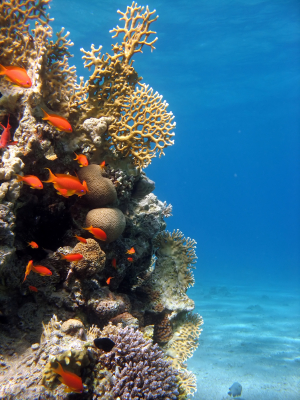
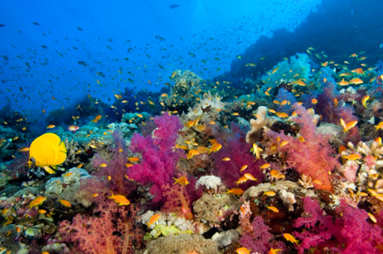
We spent the day snorkeling at Dahab with two people we met there, Steve and Ramah. Dahab is Paradise. Amazing coral and fish.
Reuben and I settled into a routine
while we were at the beach.
We would go out snorkeling twice a day, once in the mid-morning, once in the mid-afternoon.
We wore our t-shirts, put on our masks, and began to kick out into the Red Sea. The water was very shallow, the bottom dull brown and just a couple of feet deep,
as we kicked for twenty or thirty minutes.
Then, all of a sudden, the bottom dropped off as we reached the edge of the reef.
I could look straight down ten meters
to the bottom through crystal clear, blue water. We were surrounded by innumerable fish of all sizes and colors, swimming all around and in and out of the coral.
The coral was gorgeous. Fans, fingers and other shapes, greens, reds, purples, yellows, whites. We swam alongside the fish, in and out of the coral.
The fish had no fear of us, and swam within touching distance. Looking to either side I could see for what seemed like hundreds of meters in each direction
along the edge of the reef. We stayed out snorkeling as long as we could, but after about half an hour we became too cold and had to return.
I saw almost every fish in the Red Sea Diver’s Guide.
After a week in the desert with no showers and the constant salt water our hair became permanently stiff, as if we kept it seriously gelled.
We kept it covered in our Bedouin head coverings.
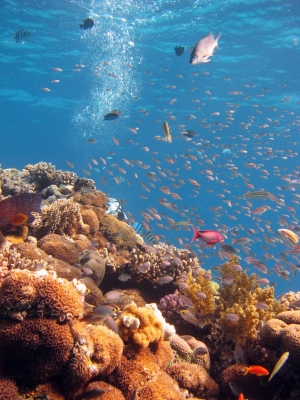

Caught the bus to Sharm El Sheik, near the southern tip of the Sinai peninsula.

Back to Eilat.

Pleasant morning swimming in Eilat and swim parade. Bus to Be’er Sheva. An Israeli woman was reading The Late Great Planet Earth
in Hebrew, “Out of curiosity,” she said. Be’er Sheva is a nice town. Met Sheri and Dara who let us use their bathroom.
I had to work on my sticky, stiff hair for quite awhile with their shampoo before I began to feel normal again. That shower felt so good after a week in the desert.
Shari and Dara also told us about some Messianic Olim in their group. (And several months later, at the Passover Conference, I met one of them: Candace, from Be'er Sheva.)
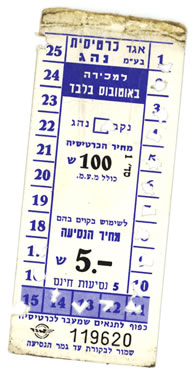

Reuben returns home from sickness, I keep traveling. Saw Abraham’s well and Be’er Sheva museum. Then I caught the bus to Masada. Spent the night at the Masada Hostel.

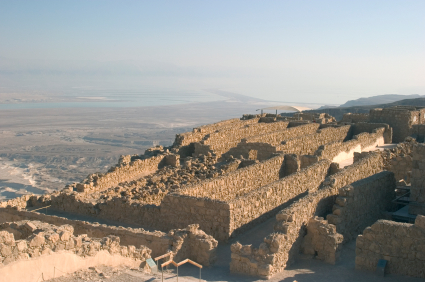
Woke up early and climbed Masada. Watched the sun rise. Saw pool and storage chambers. Got perspective by climbing adjacent mountain.
Bus to Ein Gedi and spent all day hiking all the way through. Daunted in my effort to hike through to Hevron, I slept at the beach at Ein Gedi on the Dead Sea.

Returned to Jerusalem, driving past Khirbet Qumran.
Made a mental note to return and explore the caves and ruins of Qumran.